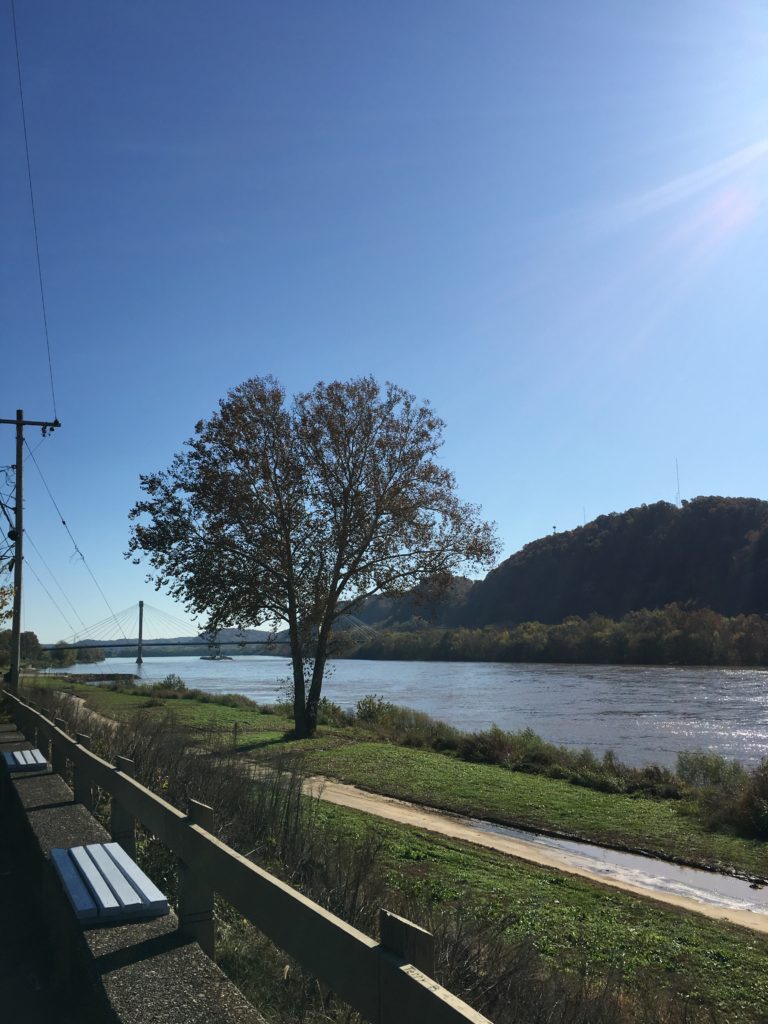Sabbatical Months Two and Three

I’m now about halfway through my sabbatical, having been on leave in November and January. I have mixed feelings about the alternating months nature of this sabbatical – there is a bit of intellectual whiplash in going from normal workday headspace to sabbatical headspace. On the other hand, it’s nice to carry around the sense of being able to hit a reset button every month.
I stuck close to home in November and January, and the only travel I took was in Cincinnati’s backyard. At the beginning of November I gave a presentation on fracking and recordkeeping at the (Re)covering Appalachia symposium at Shawnee State in Portsmouth. It was a small conference, but I found it really transformative in shifting my thinking of Cincinnati’s role in the region. One of the panels I attended was about media coverage of Appalachia, and while I’m used to thinking of the Washington Post or The New York Times as parachute journalism, it was jarring (in a healthy “examining my assumptions” way) to hear locals from the Portsmouth area characterize the Cincinnati Enquirer as being in a similar category. I often think of Cincinnati in relation to larger cities, it is really humbling and necessarily perspective-shifting to think of Cincinnati in relation to smaller towns in this Appalachian border region.
In mid-January I spent a few days in Athens at Ohio University’s archives on the other side of the reference desk, researching their collection of District 6 United Mine Workers of America records. One of the great pleasures – and also sources of anxiety – about being on sabbatical is the affordance of having time to fall down various rabbit holes without a sense of when you’ll climb back out. I wanted to use the UMWA records because of a totally speculative hunch I had about early union bargaining demands (as I was finishing this article, I was curious whether those early demands included documentation related to mine safety). It turns out I didn’t really find the kind of thing I was hoping to find, but everything else was pretty fascinating and filled in a lot of knowledge gaps I had around the New Deal and labor. The OU library staff are a great bunch of people, and I loved spending time with them.
I haven’t totally shaken off the productivity guilt I talked about after my first month. I feel both thankful for the space to rest my mind but especially my body – a feeling that was especially acute after a traumatic event that impacted my well-being in early November. But I also feel guilty: capitalism has so thoroughly coopted the idea of rest as being the ultimate productivity multiplier that a persistent part of me feels disappointed with myself that all of this resting hasn’t corresponded to some kind of peak productivity, that I haven’t completed both of my sabbatical proposal projects already. Rest for rest’s sake is not something I know how to translate into my final report showing how useful my sabbatical was to higher ed administrators.
But the reality is that I have “done” a lot of stuff. I took two open courses on maps and GIS. I’ve read dozens of articles and a couple of books. I’ve been writing and editing and planning and keeping up my usual levels of service work. For the first time, a publisher asked me to review an author’s book-length manuscript under contract which was incredibly rewarding (and hard!). I met with an IRB representative about one of my project proposals and while the staff member I met with was awesome, I quickly realized that my institution does not offer very good structural support for non-STEM human subject research. And then I also realized I don’t have the money, assistance, or patience to transcribe hours of interview-based phone call recordings. I read a bunch of literature and realized my original proposal would have simply replicated other work out there, and so I’m changing up that original project plan and think it will result in a much richer and more exciting and hopefully less tedious project.
I’ve also been doing a lot of work that is completely invisible and erased within the value systems of higher education. I’ve spent more time at the gym which helps me think and keeps me healthy. I’ve been doing a tremendous amount of emotional labor with the fallout around SAA’s election petition (both supporting friends who have been hurt by this and also talking to petitioners to express my severe concerns about the impact of their decision amidst other ongoing issues within the association). I took field trips to museums and lectures that aren’t obviously relevant to my work but which are planting small seeds that might germinate into something I reap years from now. Or maybe it won’t. Who knows. Not everything interesting or pleasurable or fascinating or educational has to produce a return on investment to be worth the time.
Categorised as: life
Thanks for sharing these reports! I don’t have access to sabbaticals, only limited research leave (and don’t know if it will ever be useful to me) but it’s provocative in the best ways to read about your approach to this time.